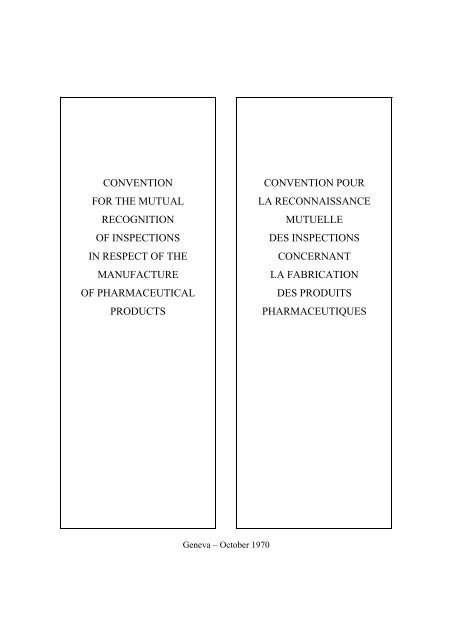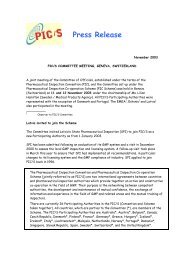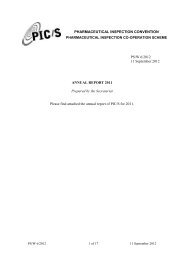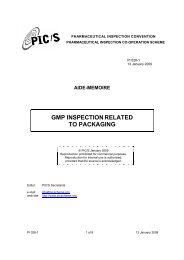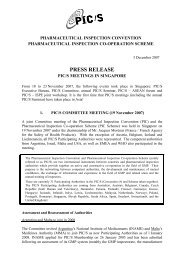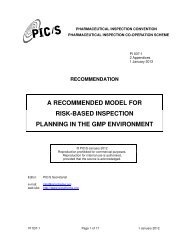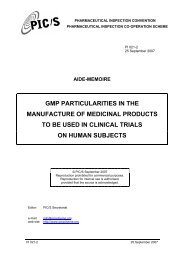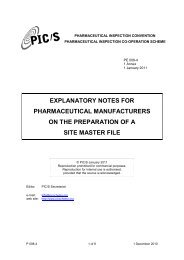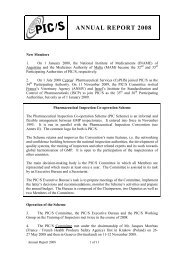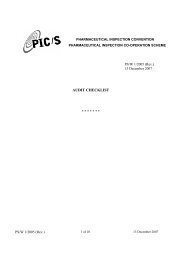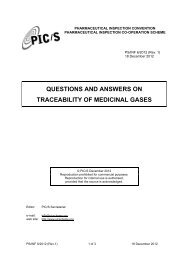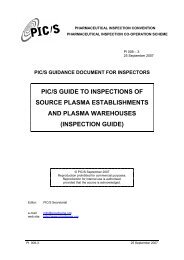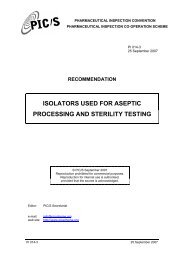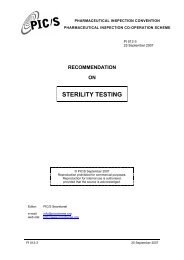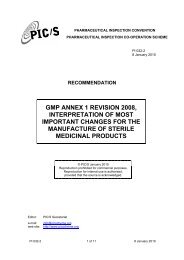Convention for the Mutual Recognition of Inspections in ... - PIC/S
Convention for the Mutual Recognition of Inspections in ... - PIC/S
Convention for the Mutual Recognition of Inspections in ... - PIC/S
You also want an ePaper? Increase the reach of your titles
YUMPU automatically turns print PDFs into web optimized ePapers that Google loves.
CONVENTIONFOR THE MUTUALRECOGNITIONOF INSPECTIONSIN RESPECT OF THEMANUFACTUREOF PHARMACEUTICALPRODUCTSCONVENTION POURLA RECONNAISSANCEMUTUELLEDES INSPECTIONSCONCERNANTLA FABRICATIONDES PRODUITSPHARMACEUTIQUESGeneva – October 1970
CONVENTIONFOR THE MUTUALRECOGNITIONOF INSPECTIONSIN RESPECT OF THEMANUFACTUREOF PHARMACEUTICALPRODUCTSCONVENTION POURLA RECONNAISSANCEMUTUELLEDES INSPECTIONSCONCERNANTLA FABRICATIONDES PRODUITSPHARMACEUTIQUESPublished <strong>in</strong> October 1970byTHE EUROPEANFREE TRADE ASSOCIATION9-11, rue de Varembé - GenevaPublié en octobre 1970parl’ASSOCIATION EUROPÉENNEDE LIBRE-ÉCHANGE9-11, rue de Varembé - Geneva
CONVENTIONFOR THE MUTUALRECOGNITIONOF INSPECTIONSIN RESPECT OF THEMANUFACTUREOF PHARMACEUTICALPRODUCTSCONVENTION POURLA RECONNAISSANCEMUTUELLEDES INSPECTIONSCONCERNANTLA FABRICATIONDES PRODUITSPHARMACEUTIQUES(and Explanatory Notes)(et Notes explicatives)PREAMBLEThe Republic <strong>of</strong> Austria, <strong>the</strong> K<strong>in</strong>gdom <strong>of</strong>Denmark, <strong>the</strong> Republic <strong>of</strong> F<strong>in</strong>land, <strong>the</strong>Republic <strong>of</strong> Iceland, <strong>the</strong> Pr<strong>in</strong>cipality <strong>of</strong>Liechtenste<strong>in</strong>, <strong>the</strong> K<strong>in</strong>gdom <strong>of</strong> Norway, <strong>the</strong>Portuguese Republic, <strong>the</strong> K<strong>in</strong>gdom <strong>of</strong>Sweden, <strong>the</strong> Swiss Confederation and <strong>the</strong>United K<strong>in</strong>gdom <strong>of</strong> Great Brita<strong>in</strong> andNor<strong>the</strong>rn Ireland:Consider<strong>in</strong>g that <strong>in</strong> <strong>the</strong> <strong>in</strong>terest <strong>of</strong> publichealth pharmaceutical products whe<strong>the</strong>rexported or not should be producedaccord<strong>in</strong>g to appropriate standards;Consider<strong>in</strong>g that <strong>the</strong> rapid development <strong>of</strong>new drugs, especially complex syn<strong>the</strong>ticsubstances <strong>of</strong> great pharmacologicalpotency, necessitates strict quality control<strong>of</strong> <strong>the</strong>ir manufacture;Consider<strong>in</strong>g that <strong>of</strong>ficial <strong>in</strong>spection isnecessary to ensure such manufactur<strong>in</strong>gcontrol;PRÉAMBULELa République d’Grande-Bretagne, leRoyaume de Danemark, la République deF<strong>in</strong>lande, la République d’Islande, laPr<strong>in</strong>cipauté de Liechtenste<strong>in</strong>, le Royaume deNorvège, la République Portugaise, leRoyaume de Suède, la Confédération Suisseet le Grande-Bretagne de Grande-Bretagneet d’Irlandc du Nord,Considérant que dans 1’<strong>in</strong>térêt de la santépublique, les produits pharmaceutiques,qu’ils soient exportés ou non, devraientêtre fabriqués selon des normes appropriées;Considérant que 1’apparition rapide denouveaux remèdes, notamment desubstances synthétiques complexes àgrande puissance pharmacologique, exigeun strict contrôle de la qualité de leurfabrication;Considérant qu’une <strong>in</strong>spection <strong>of</strong>ficielleest nécessaire pour assurer pareil contrôlede la fabrication;3
Determ<strong>in</strong>ed to have effective systems <strong>of</strong>national <strong>in</strong>spection and test<strong>in</strong>g <strong>of</strong>pharmaceutical products operat<strong>in</strong>g <strong>in</strong> <strong>the</strong>ircountries;Hav<strong>in</strong>g regard to <strong>the</strong> work alreadyundertaken between <strong>the</strong> Nordic countriesand to <strong>the</strong> discussions <strong>in</strong> progress <strong>in</strong> o<strong>the</strong>r<strong>in</strong>ternational organizations, especially <strong>the</strong>World Health Organization and <strong>the</strong>Council <strong>of</strong> Europe (Partial Agreement);Consider<strong>in</strong>g that <strong>the</strong> present <strong>Convention</strong>would contribute towards <strong>the</strong> removal <strong>of</strong>obstacles <strong>in</strong> <strong>in</strong>ternational trade on a widerscale through <strong>the</strong> recognition <strong>of</strong> <strong>in</strong>spectionsmade by national health authorities;Déterm<strong>in</strong>és à avoir sur le plan national dessystèmes efficaces d’<strong>in</strong>spection et d’essaides produits pharmaceutiques;Vu les travaux déjà entrepris entre les paysnordiques et les discussions en cours dansd’autres organisations <strong>in</strong>ternationales,notamment 1’Organisation mondiale de lasanté et au Conseil de 1’Europe (Accordpartiel);Considérant que la présente <strong>Convention</strong>contribuerait à une élim<strong>in</strong>ation plusétendue des obstacles au commerce<strong>in</strong>ternational par la reconnaissance des<strong>in</strong>spections effectuées par les autoritéssanitaires nationales,Have agreed as follows: Sont convenus de ce qui suit :PART ICHAPITRE IExchange <strong>of</strong> <strong>in</strong><strong>for</strong>mationEchange d’<strong>in</strong><strong>for</strong>mationsARTICLE 1 ARTICLE 11. The Contract<strong>in</strong>g States shall exchange,<strong>in</strong> accordance with <strong>the</strong> provisions <strong>of</strong> this<strong>Convention</strong>, such <strong>in</strong><strong>for</strong>mation as isnecessary <strong>for</strong> <strong>the</strong> mutual recognition <strong>of</strong><strong>in</strong>spections relat<strong>in</strong>g to pharmaceuticalproducts manufactured with<strong>in</strong> <strong>the</strong>irterritories and <strong>in</strong>tended <strong>for</strong> import <strong>in</strong>to o<strong>the</strong>rContract<strong>in</strong>g States.2. For <strong>the</strong> purpose <strong>of</strong> this <strong>Convention</strong>“pharmaceutical product” means:(a) any medic<strong>in</strong>e or similar product<strong>in</strong>tended <strong>for</strong> human use which is subjectto control by health legislation <strong>in</strong> <strong>the</strong>manufactur<strong>in</strong>g Contract<strong>in</strong>g State or <strong>in</strong><strong>the</strong> import<strong>in</strong>g Contract<strong>in</strong>g State; and(b) any <strong>in</strong>gredient which <strong>the</strong> manufactureruses <strong>in</strong> <strong>the</strong> manufacture <strong>of</strong> a productreferred to <strong>in</strong> subparagraph (a) above.1. Les Etats Contractants échangent,con<strong>for</strong>mément aux dispositions de laprésente <strong>Convention</strong>, les <strong>in</strong><strong>for</strong>mationsnécessaires à la reconnaissance mutuelle des<strong>in</strong>spections concernant les produitspharmaceutiques fabriqués sur leursterritoires et dest<strong>in</strong>és à 1’importation dansd’autres Etats Contractants.2. Aux f<strong>in</strong>s de la présente <strong>Convention</strong>,1’expression “produit pharmaceutique”signifie :(a) tout médicament ou produit similairedest<strong>in</strong>é à 1’usage huma<strong>in</strong> qui est soumisau contrôle prévu par la législationsanitaire dans 1’Etat Contractant defabrication ou dans 1’Etat Contractantd’importation;(b) tout <strong>in</strong>grédient que le fabricant utilisedans la fabrication d’un produit auquelse réfère l’al<strong>in</strong>éa (a) ci-dessus.4
ARTICLE 2 ARTICLE 21. Upon <strong>the</strong> request <strong>of</strong> <strong>the</strong> competentauthority <strong>of</strong> a Contract<strong>in</strong>g State <strong>in</strong>to which apharmaceutical product manufactured <strong>in</strong>ano<strong>the</strong>r Contract<strong>in</strong>g State is to be imported,<strong>the</strong> competent authority <strong>of</strong> <strong>the</strong> latter Stateshall, subject to <strong>the</strong> provisions <strong>of</strong> Article 4,provide <strong>in</strong><strong>for</strong>mation regard<strong>in</strong>g :(a) <strong>the</strong> general standards <strong>of</strong> manufactur<strong>in</strong>gpractice <strong>in</strong> a particular firm;(b) <strong>the</strong> specific standards <strong>of</strong> manufactureand control <strong>of</strong> a given product <strong>in</strong> aparticular firm;(c) supplementary questions <strong>of</strong> <strong>the</strong>request<strong>in</strong>g competent authority whichare relevant to <strong>the</strong> quality control <strong>of</strong>pharmaceutical products and based on<strong>the</strong> legal provisions <strong>of</strong> <strong>the</strong> import<strong>in</strong>gContract<strong>in</strong>g State.2. In<strong>for</strong>mation provided under this<strong>Convention</strong> shall not extend to dataconcern<strong>in</strong>g f<strong>in</strong>ancial and commercialmatters or, <strong>in</strong> so far as <strong>the</strong>y are not related toquality control <strong>of</strong> manufacture, to dataconcern<strong>in</strong>g technical “know-how”, research<strong>in</strong><strong>for</strong>mation and personal data o<strong>the</strong>r thanthose relat<strong>in</strong>g to <strong>the</strong> duties <strong>of</strong> <strong>the</strong> personsconcerned1. Sur la demande de 1'autoritécompétente d'un Etat Contractant danslequel doit être importé un produitpharmaceutique fabriqué dans un autre EtatContractant, 1'autorité compétente de celuicidonne, sous réserve des dispositions del'article 4, des <strong>in</strong><strong>for</strong>mations:(a) concernant les normes générales despratiques de fabrication dans uneentreprise particulière;(b) concernant les normes particulières dela fabrication et du contrôle d'un produitdonné dans une entreprise déterm<strong>in</strong>ée;(c) en réponse aux questions supplémentairesde 1'autorité compétenterequérante qui se rapportent au contrôlede la qualité des produitspharmaceutiques et qui sont fondées surles dispositions légales de 1'EtatContractant d'importation.2. Les <strong>in</strong><strong>for</strong>mations fournies en vertu de laprésente <strong>Convention</strong> ne s'étendent pas à desdonnées concernant des questionsf<strong>in</strong>ancières et commerciales ni, dans lamesure où elles ne se rapportent pas aucontrôle de la qualité de la fabrication, à desdonnées concernant les connaissancestechniques (“know-how”), les <strong>in</strong><strong>for</strong>mationssur la recherche et les renseignementsd’ordre personnel autres que ceux qui serapportent aux fonctions des personnes<strong>in</strong>téressées.ARTICLE 3 ARTICLE 31. The <strong>in</strong><strong>for</strong>mation to be provided shall bebased on <strong>in</strong>spections carried out by <strong>the</strong>competent authority. Such <strong>in</strong>spections shallnormally be those made <strong>in</strong> <strong>the</strong> course <strong>of</strong> <strong>the</strong>en<strong>for</strong>cement <strong>of</strong> <strong>the</strong> system <strong>of</strong> compulsorycontrol established <strong>in</strong> <strong>the</strong> manufactur<strong>in</strong>gContract<strong>in</strong>g State.2. If <strong>the</strong> product concerned does not fallwith<strong>in</strong> <strong>the</strong> system <strong>of</strong> compulsory controlestablished by <strong>the</strong> manufactur<strong>in</strong>g1. Les <strong>in</strong><strong>for</strong>mations à donner sont fondéessur les <strong>in</strong>spections effectuées par 1'autoritécompétente. Ces <strong>in</strong>spections sontnormalement celles qui sont effectuées aucours de 1'application du système decontrôle obligatoire établi dans 1'Etat Contractantde fabrication.2. Si le produit en cause n'est pas soumisau système de contrôle obligatoire établi par1'Etat Contractant de fabrication ou si le5
Contract<strong>in</strong>g State or if <strong>the</strong> system <strong>of</strong>compulsory control <strong>of</strong> <strong>the</strong> manufactur<strong>in</strong>gContract<strong>in</strong>g State, though applicable to <strong>the</strong>product concerned, does not extend to <strong>the</strong>particular aspects with regard to which <strong>the</strong><strong>in</strong><strong>for</strong>mation is sought, <strong>the</strong> export<strong>in</strong>gmanufacturer may apply to <strong>the</strong> competentauthority <strong>of</strong> <strong>the</strong> manufactur<strong>in</strong>g Contract<strong>in</strong>gState <strong>for</strong> an <strong>in</strong>spection to be made on avoluntary basis.système du contrôle obligatoire de celui-ci,bien qu'applicable au produit en cause, nes'étend pas aux aspects particuliers qui font1'objet d'une demande d'<strong>in</strong><strong>for</strong>mation, lefabricant exportateur peut demander à1'autorité compétente de 1'Etat Contractantde fabrication d'effectuer une <strong>in</strong>spection surune base volontaire.ARTICLE 4 ARTICLE 41. Be<strong>for</strong>e provid<strong>in</strong>g <strong>in</strong><strong>for</strong>mation about anyparticular firm or any product manufacturedby it, <strong>the</strong> competent authority <strong>of</strong> <strong>the</strong>manufactur<strong>in</strong>g Contract<strong>in</strong>g State shall notify<strong>the</strong> manufacturer.2. The manufacturer may at any timewithhold his consent to <strong>in</strong><strong>for</strong>mation relat<strong>in</strong>gto his firm or to any product manufacturedby him be<strong>in</strong>g disclosed to <strong>the</strong> competentauthority <strong>of</strong> ano<strong>the</strong>r Contract<strong>in</strong>g State. Insuch a case <strong>the</strong> withhold<strong>in</strong>g <strong>of</strong> consent shallbe notified to <strong>the</strong> competent authority <strong>of</strong> <strong>the</strong>Contract<strong>in</strong>g State concerned, which may:(a) where <strong>the</strong> <strong>in</strong><strong>for</strong>mation withheld relatesto <strong>the</strong> general standards <strong>of</strong>manufactur<strong>in</strong>g practice <strong>in</strong> <strong>the</strong> particularfirm, regard any product <strong>of</strong> <strong>the</strong>manufacturer;(b) where <strong>the</strong> <strong>in</strong><strong>for</strong>mation withheld relatesto a specific product only, regard thatspecific product; as be<strong>in</strong>g a product <strong>in</strong>respect <strong>of</strong> which full <strong>in</strong><strong>for</strong>mation hasnot been provided <strong>in</strong> accordance withthis <strong>Convention</strong>.1. Avant de donner des <strong>in</strong><strong>for</strong>mations surune entreprise déterm<strong>in</strong>ée ou sur tout produitfabriqué par celle-ci, l’autorité compétentede l’Etat Contractant de fabrication en donnenotification au fabricant.2. Le fabricant peut en tout temps refuserque des <strong>in</strong><strong>for</strong>mations relatives à sonentreprise ou à tout produit de sa fabricationsoient divulguées à l'autorité compétented'un autre Etat Contractant. En pareil cas, lerefus est notifié à 1'autorité compétente de1'Etat Contractant <strong>in</strong>téressé, laquelle peutconsidérer:(a) tout produit du fabricant, lorsque les<strong>in</strong><strong>for</strong>mations refusées se rapportent auxnormes générales des pratiques defabrication dans 1'entreprise particulière;(b) un produit particulier, lorsque les<strong>in</strong><strong>for</strong>mations refusées se rapportentuniquement audit produit; comme étantun produit sur lequel des <strong>in</strong><strong>for</strong>mationscomplètes n'ont pas été fourniescon<strong>for</strong>mément à la présente <strong>Convention</strong>.ARTICLE 5 ARTICLE 5If a competent authority discovers <strong>in</strong> <strong>the</strong>course <strong>of</strong> its <strong>in</strong>spection duties or o<strong>the</strong>rwiseparticular circumstances which cause apharmaceutical product to be <strong>of</strong> imm<strong>in</strong>entand serious danger to <strong>the</strong> public, it shallimmediately communicate its f<strong>in</strong>d<strong>in</strong>gs to <strong>the</strong>competent authorities <strong>of</strong> <strong>the</strong> o<strong>the</strong>rContract<strong>in</strong>g States.Si une autorité compétente découvre, aucours de ses <strong>in</strong>spections ou autrement, descirconstances particulières qui font qu'unproduit pharmaceutique présente un dangerimm<strong>in</strong>ent et sérieux pour le public, ellecommunique immédiatement sesconstatations aux autorités compétentes desautres Etats Contractants.6
PART IICHAPITRE II<strong>Inspections</strong><strong>Inspections</strong>ARTICLE 6 ARTICLE 61. Inspection with<strong>in</strong> <strong>the</strong> mean<strong>in</strong>g <strong>of</strong> this<strong>Convention</strong> shall cover personnel, premisesand facilities, equipment, hygiene andmanufactur<strong>in</strong>g and control procedures. Theessential factors to be covered are productquality specifications and productioncontrol. Product quality specifications maybe found <strong>in</strong> <strong>of</strong>ficial <strong>for</strong>mularies or should beestablished by <strong>the</strong> manufacturer. Productioncontrol embodies :(a) environmental control perta<strong>in</strong><strong>in</strong>g tosuitability <strong>of</strong> premises, equipment andstaff;(b) manufactur<strong>in</strong>g control with respect toprocess <strong>in</strong>herent factors which mightadversely affect <strong>the</strong> execution <strong>of</strong>manufactur<strong>in</strong>g procedures and withregard to adverse extraneous factors;(c) f<strong>in</strong>al control <strong>of</strong> <strong>the</strong> f<strong>in</strong>ished products toensure that <strong>the</strong>y comply with <strong>the</strong>established specifications and have beenmanufactured and controlled accord<strong>in</strong>gto prescribed procedures.1. Au sens de la présente <strong>Convention</strong>,l’<strong>in</strong>spection porte sur le personnel, leslocaux et les <strong>in</strong>stallations, le matériel,l’hygiène et les procédés de fabrication et decontrôle. Les facteurs essentiels dont il fauttenir compte sont les spécifications relativesà la qualité des produits et le contrôle de laproduction. Les spécifications de qualitépeuvent figurer dans les <strong>for</strong>mulaires <strong>of</strong>ficielsou doivent être établies par le fabricant. Lecontrôle de la production comprend :(a) le contrôle de 1'environnement qui serapporte aux conditions appropriées deslocaux, du matériel et du personnel;(b) le contrôle de la fabrication pour ce quiest des facteurs endogènes quipourraient avoir une <strong>in</strong>fluencedéfavorable sur 1'exécution desopérations de fabrication et pour ce quiest des facteurs exogènes défavorables;(c) le contrôle f<strong>in</strong>al des produits f<strong>in</strong>is af<strong>in</strong>de vérifier que ceux-ci répondent auxspécifications établies et ont étéfabriqués et contrôlés selon les procédésprescrits.2. The Contract<strong>in</strong>g States shall ensure: 2. Les Etats Contractants veillent:(a) that <strong>the</strong>ir competent authority has <strong>the</strong>power to call <strong>for</strong> <strong>the</strong> submission <strong>of</strong>quality control records and, ifappropriate, samples relat<strong>in</strong>g to anybatch <strong>of</strong> any pharmaceutical product;(b) that <strong>the</strong> <strong>in</strong>spectors <strong>in</strong> <strong>the</strong> service <strong>of</strong> <strong>the</strong>ircompetent authorities have appropriatequalifications and experience <strong>for</strong> <strong>the</strong>task to be undertaken by <strong>the</strong>m.(a) à ce que leur autorité compétente ait lepouvoir d'exiger la soumission dedossiers sur le contrôle de la qualité et,au beso<strong>in</strong>, d'échantillons de n'importequel lot d'un produit pharmaceutique;(b) à ce que les <strong>in</strong>specteurs attachés auservice de leurs autorités compétentesaient les qualifications et 1'expérienceappropriées à la tâche qui leur <strong>in</strong>combe.7
PART VCHAPITRE VGeneralClauses généralesARTICLE 9 ARTICLE 91. This <strong>Convention</strong> shall be ratified by <strong>the</strong>signatory States. The <strong>in</strong>struments <strong>of</strong>ratification shall be deposited with <strong>the</strong>Government <strong>of</strong> Sweden which shall notifyall o<strong>the</strong>r signatory States.2. This <strong>Convention</strong> shall enter <strong>in</strong>to <strong>for</strong>cen<strong>in</strong>ety days after deposit <strong>of</strong> <strong>the</strong> fifth<strong>in</strong>strument <strong>of</strong> ratification. In relation to anyo<strong>the</strong>r signatory deposit<strong>in</strong>g subsequently this<strong>Convention</strong> shall enter <strong>in</strong>to <strong>for</strong>ce thirty daysafter <strong>the</strong> date <strong>of</strong> deposit <strong>of</strong> <strong>the</strong> <strong>in</strong>strument <strong>of</strong>ratification but not be<strong>for</strong>e <strong>the</strong> expiry <strong>of</strong> <strong>the</strong>period <strong>of</strong> n<strong>in</strong>ety days.3. Any arrangements <strong>in</strong> relation to <strong>the</strong><strong>in</strong>spection system <strong>of</strong> a Contract<strong>in</strong>g Statewhich are necessary <strong>in</strong> order to comply with<strong>the</strong> provisions <strong>of</strong> this <strong>Convention</strong> shall becompleted not later than eighteen monthsafter deposit <strong>of</strong> <strong>the</strong> <strong>in</strong>strument <strong>of</strong> ratification<strong>of</strong> that Contract<strong>in</strong>g State. Such arrangementsshall be communicated to <strong>the</strong> depositaryGovernment which shall notify all o<strong>the</strong>rContract<strong>in</strong>g States.4. Each Contract<strong>in</strong>g State shallcommunicate to <strong>the</strong> depositary Government,which shall notify all o<strong>the</strong>r Contract<strong>in</strong>gStates, <strong>the</strong> name and address <strong>of</strong> its pr<strong>in</strong>cipalnational authority which will be itscompetent authority with<strong>in</strong> <strong>the</strong> mean<strong>in</strong>g <strong>of</strong>this <strong>Convention</strong>.1. La présente <strong>Convention</strong> sera ratifiée parles Etats signataires. Les <strong>in</strong>struments deratification seront déposés auprès duGouvernement de la Suède qui en donneranotification à tous les autres Etatssignataires.2. La présente <strong>Convention</strong> entrera envigueur quatre-v<strong>in</strong>gt-dix jours après le dépôtdu c<strong>in</strong>quième <strong>in</strong>strument de ratification.Pour tout autre signataire déposantultérieurement son <strong>in</strong>strument deratification, la présente <strong>Convention</strong> entreraen vigueur trente jours après la date du depôtdudit <strong>in</strong>strument, mais pas avant 1'expirationde la période de quatre-v<strong>in</strong>gt-dix jours.3. Les arrangements nécessaires pouradapter le système d'<strong>in</strong>spection d'un EtatContractant aux dispositions de la présente<strong>Convention</strong> seront pris dix-huit mois au plustard après le dépôt de l’<strong>in</strong>strument deratification dudit Etat Contractant. Lesditsarrangements seront communiqués auGouvernement dépositaire qui les notifiera àtous les autres Etats Contractants.4. Tout Etat Contractant communique auGouvernement dépositaire, qui en donnenotification à tous les autres EtatsContractants, le nom et 1'adresse de sapr<strong>in</strong>cipale autorité nationale qui sera1'autorite compétente au sens de la présente<strong>Convention</strong>.ARTICLE 10 ARTICLE 101. The depositary Government shall notifyto all o<strong>the</strong>r Contract<strong>in</strong>g States anyrecommendation relat<strong>in</strong>g to <strong>the</strong>implementation <strong>of</strong> this <strong>Convention</strong> received<strong>in</strong> accordance with paragraph 1 (e) <strong>of</strong>Article 8.1. Le Gouvernement dépositaire notifie àtous les autres Etats Contractants touterecommandation relative à la mise en oeuvrede la présente <strong>Convention</strong> reçuecon<strong>for</strong>mément au paragraphe 1 (e) del'article 8.9
2. The depositary Government shallsubmit to all o<strong>the</strong>r Contract<strong>in</strong>g States <strong>for</strong>acceptance any proposal <strong>for</strong> amendment <strong>of</strong>this <strong>Convention</strong> received <strong>in</strong> accordance withparagraph 1 (e) <strong>of</strong> Article 8 or from anyContract<strong>in</strong>g State.3. If, with<strong>in</strong> sixty days from <strong>the</strong> date <strong>of</strong> <strong>the</strong>submission <strong>of</strong> a proposal <strong>for</strong> amendment, aContract<strong>in</strong>g State requests that negotiationsbe opened on <strong>the</strong> proposal, <strong>the</strong> depositaryGovernment shall arrange <strong>for</strong> suchnegotiations to be held.4. Provided it is accepted by allContract<strong>in</strong>g States, an amendment <strong>of</strong> this<strong>Convention</strong> shall enter <strong>in</strong>to <strong>for</strong>ce thirty daysafter deposit <strong>of</strong> <strong>the</strong> last <strong>in</strong>strument <strong>of</strong>acceptance unless ano<strong>the</strong>r date is provided<strong>for</strong> <strong>in</strong> <strong>the</strong> amendment. Instruments <strong>of</strong> acceptanceshall be deposited with <strong>the</strong> depositaryGovernment which shall notify all o<strong>the</strong>rContract<strong>in</strong>g States.2. Le Gouvernement dépositaire soumet à1'acceptation de tous les autres EtatsContractants toute proposition d'amendementde la présente <strong>Convention</strong> reçuecon<strong>for</strong>mément au paragraphe 1 (e) del'article 8 ou de tout Etat Contractant.3. Si, dans les soixante jours à partir de ladate à laquelle une proposition d'amendementa été soumise, un Etat Contractantdemande 1'ouverture de négociations sur laditeproposition, le Gouvernementdépositaire prend les dispositionsnécessaires à cet effet.4. Sous réserve de son acceptation par tousles Etats Contractants, un amendement à laprésente <strong>Convention</strong> entrera en vigueurtrente jours après le dépôt du dernier<strong>in</strong>strument d'acceptation, à mo<strong>in</strong>s qu'uneautre date ne soit prévue dans 1'amendement.Les <strong>in</strong>struments d'acceptation serontdéposés auprès du Gouvernementdépositaire qui en donnera notification àtous les autres Etats Contractants.ARTICLE 11 ARTICLE 111. Any State be<strong>in</strong>g a Member <strong>of</strong> <strong>the</strong>United Nations or <strong>of</strong> any <strong>of</strong> <strong>the</strong> specializedagencies or <strong>of</strong> <strong>the</strong> International AtomicEnergy Agency or a party to <strong>the</strong> Statute <strong>of</strong><strong>the</strong> International Court <strong>of</strong> justice and hav<strong>in</strong>g<strong>the</strong> national arrangements necessary to applyan <strong>in</strong>spection system comparable to thatreferred to <strong>in</strong> this <strong>Convention</strong> may, upon<strong>in</strong>vitation <strong>of</strong> <strong>the</strong> Contract<strong>in</strong>g States to betransmitted by <strong>the</strong> depositary Government,accede to this <strong>Convention</strong>.2. The date <strong>of</strong> <strong>the</strong> entry <strong>in</strong>to <strong>for</strong>ce <strong>of</strong> this<strong>Convention</strong> <strong>in</strong> relation to an acced<strong>in</strong>g Stateshall be agreed between that State and <strong>the</strong>Contract<strong>in</strong>g States.3. Instruments <strong>of</strong> accession shall bedeposited with <strong>the</strong> depositary Governmentwhich shall notify all o<strong>the</strong>r Contract<strong>in</strong>gStates.1. Tout Etat membre de 1'Organisation desNations Unies ou membre d’une <strong>in</strong>stitutionspécialisée ou de 1'Agence <strong>in</strong>ternationale de1'énergie atomique ou partie au Statut de laCour <strong>in</strong>ternationale de justice disposant surle plan <strong>in</strong>terne des arrangements nécessairespour appliquer un système d'<strong>in</strong>spectioncomparable à celui qui est mentionné dans laprésente <strong>Convention</strong> peut, sur 1'<strong>in</strong>vitationdes Etats Contractants qui sera transmise parle Gouvernement dépositaire, adhérer à laprésente <strong>Convention</strong>.2. La date de 1'entrée en vigueur de laprésente <strong>Convention</strong> en ce qui concerne unEtat adhérent est convenue entre celui-ci etles Etats Contractants.3. Les <strong>in</strong>struments d'adhésion serontdéposés auprès du Gouvernementdépositaire qui en donnera notification àtous les autres Etats Contractants.10
ARTICLE 12 ARTICLE 12Any Contract<strong>in</strong>g State may withdrawfrom this <strong>Convention</strong> provided that it givestwelve months’ notice <strong>in</strong> writ<strong>in</strong>g to <strong>the</strong>depositary Government which shall notifyall o<strong>the</strong>r Contract<strong>in</strong>g States.Tout Etat Contractant peut se retirer dela présente <strong>Convention</strong> moyennant unpréavis écrit de douze mois auGouvernement dépositaire qui en donneranotification à tous les autres EtatsContractants.ARTICLE 13 ARTICLE 13The Explanatory Notes annexed to this<strong>Convention</strong> shall <strong>for</strong>m an <strong>in</strong>tegral part <strong>of</strong> itand serve <strong>for</strong> <strong>the</strong> <strong>in</strong>terpretation andexplanation <strong>of</strong> its provisions.IN WITNESS WHEREOF <strong>the</strong> undersigned,duly authorized <strong>the</strong>reto, have signed <strong>the</strong>present <strong>Convention</strong>.DONE at GenevaLes Notes explicatives annexées à laprésente <strong>Convention</strong> font partie <strong>in</strong>tégrantede celle-ci et servent à l’<strong>in</strong>terprétation et àl’explication de ses dispositions.EN FOI DE QUOI, les soussignés, dûmentautorisés à cet effet, ont signé la présente<strong>Convention</strong>.FAIT à GenèveThis 8th day <strong>of</strong> October 1970 le 8 octobre 1970<strong>in</strong> a s<strong>in</strong>gle copy <strong>in</strong> <strong>the</strong> English and Frenchlanguages, both texts be<strong>in</strong>g equallyau<strong>the</strong>ntic, which shall be deposited with <strong>the</strong>Government <strong>of</strong> Sweden by which certifiedcopies shall be transmitted to all o<strong>the</strong>rsignatory and acced<strong>in</strong>g States.en français et en anglais, les deux textesfaisant également foi, en un seul exemplairequi sera déposé auprès du Gouvernement dela Suède qui en transmettra copie certifiéecon<strong>for</strong>me à tous les autres Etats signataireset adhérents.11
EXPLANATORY NOTESNOTES EXPLICATIVESTitle and scope <strong>of</strong> <strong>the</strong> <strong>Convention</strong>Titre et portée de la <strong>Convention</strong>1. This <strong>Convention</strong> deals with <strong>the</strong> mutual 1. La présente <strong>Convention</strong> traite de larecognition <strong>of</strong> <strong>in</strong>spections <strong>in</strong> respect <strong>of</strong> <strong>the</strong>manufacture <strong>of</strong> pharmaceutical products andreconnaissance mutuelle des <strong>in</strong>spectionsconcernant la fabrication des produitswith <strong>the</strong> measures necessary to achieve such pharmaceutiques et des mesuresrecognition. It is <strong>the</strong>re<strong>for</strong>e concerned with nécessaires pour obtenir cettequality control irrespective <strong>of</strong> whe<strong>the</strong>r reconnaissance. Elle se préoccupe par<strong>in</strong><strong>for</strong>mation on such control is required <strong>in</strong> <strong>the</strong> conséquent du contrôle de la qualité, sanscourse <strong>of</strong> <strong>the</strong> registration procedure or later. égard au fait que la demandeThe <strong>Convention</strong> is not <strong>in</strong>tended to <strong>in</strong>terferewith <strong>the</strong> normal registration procedure norwith <strong>the</strong> provid<strong>in</strong>g <strong>of</strong> <strong>in</strong><strong>for</strong>mation by <strong>the</strong>manufacturer or his representative directly to<strong>the</strong> registration authority.d'<strong>in</strong><strong>for</strong>mations sur ledit contrôle a étéprésentée au cours de la procédured'enregistrement ou par la suite. La<strong>Convention</strong> n'est dest<strong>in</strong>ée à entraver ni laprocédure normale d'enregistrement ni latransmission directe au serviced'enregistrement des <strong>in</strong><strong>for</strong>mationsprovenant du fabricant ou de sonreprésentant.2. The <strong>Convention</strong> is divided <strong>in</strong>to five 2. La <strong>Convention</strong> se divise en c<strong>in</strong>qparts. The first part deals with <strong>the</strong> exchange chapitres. Le premier traite de 1'échange<strong>of</strong> <strong>in</strong><strong>for</strong>mation, <strong>the</strong> second with <strong>the</strong> d'<strong>in</strong><strong>for</strong>mations, le deuxième des<strong>in</strong>spections necessary to provide this <strong>in</strong>spections nécessaires pour fournir ces<strong>in</strong><strong>for</strong>mation and <strong>the</strong> third part with <strong>the</strong> mutual <strong>in</strong><strong>for</strong>mations et le troisième de larecognition <strong>of</strong> <strong>in</strong>spections. The fourth part reconnaissance mutuelle des <strong>in</strong>spections.deals with <strong>the</strong> consultations which shall take Le quatrième chapitre traite desplace <strong>in</strong> order to improve <strong>the</strong> practical applicationand operation <strong>of</strong> <strong>the</strong> <strong>Convention</strong>.General clauses are conta<strong>in</strong>ed <strong>in</strong> part five.consultations qui doivent avoir lieu pouraméliorer l'application pratique et lefonctionnement de la <strong>Convention</strong>. Lesclauses générales sont contenues dans lec<strong>in</strong>quième chapitre.Exchange <strong>of</strong> In<strong>for</strong>mationEchange d’<strong>in</strong><strong>for</strong>mationsArticle 1 Article 13. This Article sets out <strong>the</strong> basic pr<strong>in</strong>ciple<strong>of</strong> this <strong>Convention</strong> accord<strong>in</strong>g to whichContract<strong>in</strong>g States are prepared to exchangesuch <strong>in</strong><strong>for</strong>mation as is necessary <strong>for</strong> <strong>the</strong>mutual recognition <strong>of</strong> <strong>in</strong>spections relat<strong>in</strong>g topharmaceutical products manufactured with<strong>in</strong><strong>the</strong>ir territories and <strong>in</strong>tended <strong>for</strong> import <strong>in</strong>too<strong>the</strong>r Contract<strong>in</strong>g States. The <strong>Convention</strong>does not extend to <strong>the</strong> control <strong>of</strong> productswhich are used purely <strong>for</strong> domestic purposesalthough it presupposes a domestic controlsystem.3. L’article 1 expose le pr<strong>in</strong>cipe fondamentalde la <strong>Convention</strong> selon lequel lesEtats Contractants sont disposés àéchanger les <strong>in</strong><strong>for</strong>mations nécessaires pourla reconnaissance mutuelle des <strong>in</strong>spectionsrelatives aux produits pharmaceutiquesfabriqués sur leurs territoires et dest<strong>in</strong>és àêtre importés dans d'autres EtatsContractants. Bien qu'elle présuppose unsystème de contrôle <strong>in</strong>térieur, la<strong>Convention</strong> ne s'étend pas au contrôle desproduits qui sont dest<strong>in</strong>és uniquement à laconsommation <strong>in</strong>térieure.13
4. The def<strong>in</strong>ition <strong>in</strong> paragraph 2 is not<strong>in</strong>tended to affect <strong>the</strong> very differentdef<strong>in</strong>itions conta<strong>in</strong>ed <strong>in</strong> <strong>the</strong> various nationallegislations. In order to bridge suchdifferences <strong>the</strong> def<strong>in</strong>ition <strong>of</strong> <strong>the</strong> <strong>Convention</strong>extends to all products which are subject tocontrol imposed by <strong>the</strong> health legislation <strong>of</strong><strong>the</strong> manufactur<strong>in</strong>g Contract<strong>in</strong>g State, and alsocovers products which while not fall<strong>in</strong>g underthis control <strong>in</strong> <strong>the</strong> country <strong>of</strong> manufacture doso <strong>in</strong> <strong>the</strong> import<strong>in</strong>g Contract<strong>in</strong>g State.Due to <strong>the</strong> differences <strong>in</strong> national legislation<strong>in</strong> <strong>the</strong> Contract<strong>in</strong>g States, terms have beenused deliberately which are ra<strong>the</strong>r broad.“Any medic<strong>in</strong>e or similar product” has beenused <strong>in</strong> order to cover all sorts <strong>of</strong> medic<strong>in</strong>e(medicament, Arzneimittel, laegemiddel,lääkea<strong>in</strong>e, lif, legemiddel, medicamentos,läkemedel, medic<strong>in</strong>ali or equivalent terms)which <strong>in</strong> any one <strong>of</strong> <strong>the</strong> Contract<strong>in</strong>g Statesare subject to <strong>the</strong> control <strong>of</strong> health legislation.The def<strong>in</strong>ition does not cover veter<strong>in</strong>aryproducts.5. As far as <strong>in</strong>gredients are concerned it is<strong>for</strong> <strong>the</strong> manufacturer to satisfy himself as to<strong>the</strong> quality <strong>of</strong> <strong>the</strong> <strong>in</strong>gredients purchased fromo<strong>the</strong>r firms be<strong>for</strong>e us<strong>in</strong>g <strong>the</strong>m <strong>in</strong> <strong>the</strong>manufacture <strong>of</strong> his pharmaceutical product.The <strong>in</strong>spections by <strong>the</strong> competent authoritiesand <strong>the</strong> <strong>in</strong><strong>for</strong>mation to be provided wouldhave to ascerta<strong>in</strong> whe<strong>the</strong>r <strong>the</strong> manufacturerdoes <strong>in</strong> fact do so.6. In this connection it should be noted that<strong>the</strong> terms “manufacturer” and “manufactur<strong>in</strong>g”are used <strong>in</strong> this <strong>Convention</strong> as<strong>in</strong>tend<strong>in</strong>g to cover not only firms and processes<strong>for</strong> <strong>the</strong> complete production <strong>of</strong> af<strong>in</strong>ished product, but also separate operations<strong>in</strong> <strong>the</strong> production <strong>of</strong> a pharmaceuticalproduct, such as process<strong>in</strong>g, compound<strong>in</strong>g,<strong>for</strong>mulat<strong>in</strong>g, fill<strong>in</strong>g, pack<strong>in</strong>g, labell<strong>in</strong>g, etc.,irrespective <strong>of</strong> whe<strong>the</strong>r <strong>the</strong>se operations arecarried out by one or more firms.4. La déf<strong>in</strong>ition figurant au paragraphe 2n'est pas dest<strong>in</strong>ée à affecter les déf<strong>in</strong>itionstrès différentes contenues dans les diverses1egislations nationales. Af<strong>in</strong> de surmonterlesdites différences, la déf<strong>in</strong>ition de la<strong>Convention</strong> s'étend à tous les produits quisont soumis au contrôle imposé par lalégislation sanitaire de 1'Etat Contractantde fabrication et comprend aussi lesproduits qui, tout en ne tombant pas sousce contrôle dans le pays de fabrication, ysont soumis dans 1'Etat Contractant d'importation.En raison des différences entre leslégislations nationales des Etats Contractants,le choix s'est porte délibérémentsur des expressions plutôt larges.L'expression “tout médicament ou produitsimilaire” a été utilisée af<strong>in</strong> de couvrir tousles genres de médicaments (medic<strong>in</strong>e,Arzneimittel, laegemiddel, lääkea<strong>in</strong>e, lif,legemiddel, medicamentos, läkemedel,medic<strong>in</strong>ali ou expressions équivalentes)qui sont soumis au contrôle de lalégislation sanitaire dans n'importe lequeldes Etats Contractants. La déf<strong>in</strong>itionn'<strong>in</strong>clut pas les produits vétér<strong>in</strong>aires.5. Pour autant qu'il s'agisse des<strong>in</strong>grédients, il <strong>in</strong>combe au fabricant des'assurer de la qualité des <strong>in</strong>grédientsachetés à d'autres firmes avant de lesutiliser dans la fabrication de son produitpharmaceutique. Les <strong>in</strong>spections par lesautorités compétentes et les <strong>in</strong><strong>for</strong>mations àfournir devraient permettre de s'assurerque le fabricant agit bien de la sorte.6. A ce propos, il convient d'observerque les expressions “fabricant” et“fabrication” sont utilisées dans la présente<strong>Convention</strong> comme comprenant nonseulement les entreprises et les procédésde la production complète d'un produitf<strong>in</strong>i, mais aussi des opérations dist<strong>in</strong>ctesdans la production d'un produitpharmaceutique telles que la préparation,la composition, la <strong>for</strong>mulation galénique,le remplissage, le conditionnement,1'étiquetage, etc., que ces opérations soienteffectuées par une ou plusieurs entreprises.14
Article 2 Article 27. In<strong>for</strong>mation is to be provided upon <strong>the</strong>request <strong>of</strong> <strong>the</strong> competent authority <strong>of</strong> animport<strong>in</strong>g Contract<strong>in</strong>g State. The request canrelate ei<strong>the</strong>r to <strong>the</strong> general standards <strong>of</strong>manufactur<strong>in</strong>g practice, or to specificstandards <strong>of</strong> manufacture and quality control<strong>in</strong> respect <strong>of</strong> particular products, or to both.Fur<strong>the</strong>rmore, supplementary questions can beasked by <strong>the</strong> request<strong>in</strong>g competent authority.These supplementary questions must berelevant to <strong>the</strong> quality control <strong>of</strong>pharmaceutical products which are to beimported <strong>in</strong>to <strong>the</strong> territory <strong>of</strong> <strong>the</strong> request<strong>in</strong>gauthority and must be based on <strong>the</strong> provisions<strong>of</strong> <strong>the</strong> health legislation <strong>of</strong> <strong>the</strong> import<strong>in</strong>gContract<strong>in</strong>g State, that is to say, thatsupplementary questions can be asked butonly those <strong>in</strong> respect <strong>of</strong> which a request<strong>in</strong>gauthority needs an answer <strong>in</strong> order to complywith <strong>the</strong> provisions <strong>of</strong> its national legislation.In provid<strong>in</strong>g <strong>the</strong> <strong>in</strong><strong>for</strong>mation <strong>the</strong> provisions <strong>of</strong>Article 4, giv<strong>in</strong>g protection to <strong>the</strong>manufacturer, have to be applied (cf. notes onArticle 4).8. The <strong>in</strong><strong>for</strong>mation to be supplied underArticle 2 and requests <strong>for</strong> such <strong>in</strong><strong>for</strong>mationshall be <strong>in</strong> writ<strong>in</strong>g if so required by ei<strong>the</strong>r <strong>of</strong><strong>the</strong> <strong>in</strong>terested competent authorities; <strong>in</strong><strong>for</strong>mationcan be exchanged orally between<strong>the</strong> competent authorities <strong>of</strong> Contract<strong>in</strong>gStates which desire to proceed <strong>in</strong> this way. Inaddition to <strong>the</strong> <strong>of</strong>ficial channel <strong>in</strong><strong>for</strong>mationcan also be transmitted to <strong>the</strong> competentauthority <strong>of</strong> <strong>the</strong> import<strong>in</strong>g Contract<strong>in</strong>g State,if this is acceptable to <strong>the</strong> latter, through <strong>the</strong>exporter's representative <strong>in</strong> that State.9. On account <strong>of</strong> its confidential nature,<strong>in</strong><strong>for</strong>mation provided under <strong>the</strong> <strong>Convention</strong>shall not be disclosed to persons outside <strong>the</strong>public health service <strong>of</strong> a Contract<strong>in</strong>g State.This provision does not exclude <strong>the</strong>7. Les <strong>in</strong><strong>for</strong>mations sont données sur lademande de 1'autorité compétente d'unEtat Contractant d'importation. Lademande peut se rapporter soit aux normesgénérales des pratiques de fabrication, soitaux conditions spécifiques de fabricationet de contrôle de la qualité en ce quiconcerne des produits particuliers, soit auxdeux a la fois. En outre, des questionssupplémentaires peuvent être posées par1'autorité compétente requérante. Cesquestions supplémentaires doivent serapporter au contrôle de la qualité desproduits pharmaceutiques qui doivent êtreimportés dans le territoire de 1'autoritérequérante et se fonder sur les dispositionsde la législation sanitaire de 1'Etat Contractantd'importation; cela signifie queseules peuvent être posées des questionssupplémentaires dont la réponse estnécessaire à une autorité requérante pourque les dispositions de sa législationnationale soient observées. En donnant les<strong>in</strong><strong>for</strong>mations, il y a lieu d'appliquer lesdispositions de l'article 4 qui protégent lefabricant (cf. notes sur l'article 4).8. Les <strong>in</strong><strong>for</strong>mations qui doivent êtredonnées au titre de l'article 2 a<strong>in</strong>si que lesdemandes relatives à ces <strong>in</strong><strong>for</strong>mationsseront remises par écrit si l'une ou 1'autredes autorités compétentes <strong>in</strong>téressées ledemande; les <strong>in</strong><strong>for</strong>mations peuvent êtreéchangées oralement entre les autoritéscompétentes des Etats Contractants quidésirent procéder de cette manière. Outrela voie <strong>of</strong>ficielle, des <strong>in</strong><strong>for</strong>mations peuventaussi être transmises à 1'autoritécompétente de 1'Etat Contractantd'importation, si elle 1'accepte, par lereprésentant de l'exportateur dans leditEtat.9. Vu leur nature confidentielle, les<strong>in</strong><strong>for</strong>mations fournies en vertu de la<strong>Convention</strong> ne seront pas divulguées à despersonnes qui ne font pas partie desservices de la santé publique d'un Etat15
transmission <strong>of</strong> <strong>in</strong><strong>for</strong>mation to personsoutside <strong>the</strong> government service <strong>of</strong> aContract<strong>in</strong>g State <strong>in</strong> connection with <strong>the</strong>exercise by those persons <strong>of</strong> functions relatedto <strong>the</strong> medic<strong>in</strong>es or pharmaceutical legislation<strong>of</strong> that State.10. In<strong>for</strong>mation <strong>of</strong> <strong>the</strong> type described <strong>in</strong>Article 2, paragraph 2, is, however, <strong>in</strong> anyevent excluded from <strong>the</strong> provisions <strong>of</strong> <strong>the</strong><strong>Convention</strong>. There<strong>for</strong>e, <strong>the</strong> omission <strong>of</strong> such<strong>in</strong><strong>for</strong>mation does not imply that full<strong>in</strong><strong>for</strong>mation has not been given <strong>in</strong> accordancewith this <strong>Convention</strong>. The expression“technical ‘knowhow’” is meant to compriseany technical process <strong>in</strong> <strong>the</strong> course <strong>of</strong>production, which is not generally known.“Personal data relat<strong>in</strong>g to <strong>the</strong> duties <strong>of</strong> <strong>the</strong>persons concerned” are data such as <strong>the</strong>relevant education, practical experience,functions and duties with<strong>in</strong> <strong>the</strong> enterprise andwhe<strong>the</strong>r <strong>the</strong> personnel <strong>of</strong> <strong>the</strong> enterprise ismedically checked from time to time.11. It is <strong>the</strong> understand<strong>in</strong>g <strong>of</strong> <strong>the</strong> Contract<strong>in</strong>gStates that <strong>in</strong> exceptional circumstanceswhere <strong>the</strong> exchange <strong>of</strong> <strong>in</strong><strong>for</strong>mation has notsatisfied fully <strong>the</strong> import<strong>in</strong>g country'srequirements, <strong>the</strong> competent authorities <strong>of</strong>that country and <strong>of</strong> <strong>the</strong> export<strong>in</strong>g countryshould seek practical means <strong>of</strong> overcom<strong>in</strong>g<strong>the</strong> import<strong>in</strong>g country's doubts. Such practicalmeans may <strong>in</strong>clude <strong>in</strong><strong>for</strong>mal discussionsabout <strong>the</strong> particular outstand<strong>in</strong>g po<strong>in</strong>ts <strong>of</strong>doubt between <strong>of</strong>ficials <strong>of</strong> <strong>the</strong> import<strong>in</strong>gcountry and <strong>of</strong> <strong>the</strong> export<strong>in</strong>g country withsuitable participation <strong>of</strong> representatives <strong>of</strong> <strong>the</strong>manufacturer concerned at a place mutuallyagreed by <strong>the</strong>m hav<strong>in</strong>g regard to <strong>the</strong> nature <strong>of</strong>those po<strong>in</strong>ts. The ensu<strong>in</strong>g written report <strong>of</strong><strong>the</strong> export<strong>in</strong>g country's <strong>in</strong>spector wouldconstitute <strong>the</strong> <strong>in</strong><strong>for</strong>mation required to beprovided under Article 2 <strong>of</strong> <strong>the</strong> <strong>Convention</strong>.Contractant. Cette disposition n'exclut pasla transmission d'<strong>in</strong><strong>for</strong>mations à despersonnes qui ne font pas partie du servicepublic d'un Etat Contractant en rapportavec 1'exercice, par ces personnes, defonctions liées à la législation sur lesmédicaments et les produits pharmaceutiquesdudit Etat.10. Cependant, des <strong>in</strong><strong>for</strong>mations du genredécrit à 1'article 2, paragraphe 2, sont danstous les cas exclues des dispositions de la<strong>Convention</strong>. Par conséquent l'omission detelles <strong>in</strong><strong>for</strong>mations ne signifie pas qu'il n'apas été donné d'<strong>in</strong><strong>for</strong>mations complètescon<strong>for</strong>mément à la <strong>Convention</strong>. Par1'expression “connaissances techniques('know-how')”, on entend tout procédétechnique utilisé au cours de la productionet qui n'est pas généralement connu. “Lesrenseignements d'ordre personnel... qui serapportent aux fonctions des personnes<strong>in</strong>téressées” portent notamment sur la<strong>for</strong>mation appropriée, sur 1'expériencepratique, sur les fonctions et les tâchesdans 1'entreprise et sur la question desavoir si le personnel de 1'entreprise estsoumis périodiquement à un contrôlemédical.11. Les Etats Contractants conviennentque dans des circonstances exceptionnellesoù 1'échange d'<strong>in</strong><strong>for</strong>mations n'a passatisfait entièrement les exigences du paysd'importation, les autorités compétentes dece pays et du pays d'exportation doiventchercher des moyens pratiques de dissiperles doutes du pays d'importation. Cesmoyens pratiques peuvent comprendre desdiscussions sans caractère <strong>for</strong>mel sur lespo<strong>in</strong>ts particuliers en suspens entre lesreprésentants du pays d'importation etceux du pays d'exportation, avec laparticipation appropriée de représentantsdu fabricant en cause, en un lieu choisid'un commun accord en tenant compte dela nature desdits po<strong>in</strong>ts. Le rapport écritprésenté ensuite par 1'<strong>in</strong>specteur du paysd'exportation constituerait les <strong>in</strong><strong>for</strong>mationsdemandées au titre de l'article 2 de la<strong>Convention</strong>.16
Article 3 Article 312. Paragraph 1 <strong>of</strong> Article 3 states <strong>the</strong> rulesthat <strong>the</strong> <strong>in</strong><strong>for</strong>mation to be given must havebeen acquired <strong>in</strong> <strong>the</strong> course <strong>of</strong> <strong>in</strong>spections. Itis <strong>the</strong>re<strong>for</strong>e not permissible to give<strong>in</strong><strong>for</strong>mation <strong>in</strong> respect <strong>of</strong> <strong>the</strong> manufacture <strong>of</strong> aproduct without <strong>the</strong> firm <strong>in</strong> question hav<strong>in</strong>gbeen <strong>in</strong>spected. The question whe<strong>the</strong>r <strong>in</strong> <strong>the</strong>case <strong>of</strong> a request a new <strong>in</strong>spection has to bemade will depend on whe<strong>the</strong>r <strong>the</strong> <strong>in</strong><strong>for</strong>mationacquired <strong>in</strong> previous <strong>in</strong>spections is up to dateand sufficient <strong>in</strong> order to reply to <strong>the</strong> request.The <strong>in</strong>spections contemplated under thisparagraph will be those which are madenormally <strong>in</strong> <strong>the</strong> course <strong>of</strong> <strong>the</strong> en<strong>for</strong>cement <strong>of</strong><strong>the</strong> system <strong>of</strong> compulsory control whichprevails <strong>in</strong> <strong>the</strong> manufactur<strong>in</strong>g Contract<strong>in</strong>gState.13. Paragraph 2 <strong>of</strong> this Article provides <strong>for</strong><strong>the</strong> case where <strong>the</strong> product or certa<strong>in</strong> aspects<strong>of</strong> its production are not subject to <strong>the</strong>compulsory control prevail<strong>in</strong>g <strong>in</strong> <strong>the</strong>manufactur<strong>in</strong>g Contract<strong>in</strong>g State. In such acase <strong>the</strong> manufacturer who wishes to exporthas <strong>the</strong> right to ask <strong>for</strong> an <strong>in</strong>spection on avoluntary basis. Such a request must becomplied with by his competent authority.Voluntary <strong>in</strong>spections must be at least <strong>of</strong> <strong>the</strong>same standard as compulsory <strong>in</strong>spections andcarried out by persons competent <strong>in</strong> <strong>the</strong> fieldconcerned. This request may be repeatedwhenever fresh <strong>in</strong>spections or follow-up<strong>in</strong>spections are necessary <strong>in</strong> order to meet <strong>the</strong>requirements <strong>of</strong> <strong>the</strong> request<strong>in</strong>g competentauthority.Article 4 Article 414. This Article is <strong>in</strong>cluded <strong>for</strong> <strong>the</strong> protection<strong>of</strong> <strong>the</strong> manufacturer. The manufacturer shallbe notified by his own competent authoritybe<strong>for</strong>e <strong>in</strong><strong>for</strong>mation is given <strong>in</strong> reply to arequest <strong>of</strong> a competent authority. It willdepend on national legislation how detailed<strong>the</strong> notification will be. The manufacturer has12. Le paragraphe 1 de l'article 3 énoncela règle selon laquelle les <strong>in</strong><strong>for</strong>mations àdonner doivent avoir été recueillies aucours d'<strong>in</strong>spections. Il n'est par conséquentpas admissible de donner des <strong>in</strong><strong>for</strong>mationsrelatives à la fabrication d'un produit sansque 1'entreprise en question ait été<strong>in</strong>spectée. Dans le cas d'une demande, ladécision d'effectuer ou non une nouvelle<strong>in</strong>spection dépendra de la réponse à laquestion de savoir si les <strong>in</strong><strong>for</strong>mationsréunies lors de précédentes <strong>in</strong>spectionssont à jour et si elles sont suffisantes pourrépondre à la demande. Les <strong>in</strong>spectionsenvisagées en vertu dudit paragraphe sontcelles qui sont effectuées normalement aucours de 1'application du système decontrôle obligatoire qui est en usage dans1'Etat Contractant de fabrication.13. Le paragraphe 2 du présent articleprévoit le cas où le produit ou certa<strong>in</strong>saspects de sa production ne sont passoumis au contrôle obligatoire en vigueurdans l’Etat contractant de fabrication. Enpareil cas, le fabricant qui désire exporter ale droit de demander une <strong>in</strong>spection surune base volontaire. L’autorité compétentedoit donner suite à cette demande. Les<strong>in</strong>spections faites sur une base volontairedoivent être d’un niveau au mo<strong>in</strong>séquivalent à celui des <strong>in</strong>spectionsobligatoires et être effectuées par despersonnes compétentes dans le doma<strong>in</strong>e encause. Cette demande peut être présentéechaque fois que des <strong>in</strong>spections nouvellesou périodiques sont nécessaires poursatisfaire les exigences de l’autoritécompétente requérante.14. Le présent article est dest<strong>in</strong>é a protégerle fabricant. Avant de donner des<strong>in</strong><strong>for</strong>mations en réponse à la demanded'une autorité étrangère compétente,1'autorité nationale compétente en donnenotification au fabricant. La notificationsera plus ou mo<strong>in</strong>s détaillée selon la17
<strong>the</strong> right to request that <strong>in</strong><strong>for</strong>mation should bewithheld and not be transmitted to <strong>the</strong>request<strong>in</strong>g competent authority. Thewithhold<strong>in</strong>g <strong>of</strong> consent is to be notified to <strong>the</strong>request<strong>in</strong>g competent authority15. Paragraph 2 <strong>of</strong> this Article deals with <strong>the</strong>rights <strong>of</strong> <strong>the</strong> request<strong>in</strong>g competent authority<strong>in</strong> such cases. The action which <strong>the</strong> latter maytake varies accord<strong>in</strong>g to whe<strong>the</strong>r <strong>the</strong> refusalconcerns <strong>in</strong><strong>for</strong>mation about <strong>the</strong> generalstandards <strong>of</strong> manufactur<strong>in</strong>g practice <strong>of</strong> <strong>the</strong>firm or concerns a specific product only. TheArticle has been drafted on <strong>the</strong> assumptionthat <strong>the</strong> rights conferred upon <strong>the</strong> request<strong>in</strong>gcompetent authority will not be used wherethis concerns <strong>in</strong><strong>for</strong>mation which is <strong>of</strong> m<strong>in</strong>orimportance only. Genu<strong>in</strong>e healthconsiderations, however, are always paramount.Article 5 Article 516. It can happen <strong>for</strong> example that <strong>in</strong> <strong>the</strong>course <strong>of</strong> <strong>the</strong> manufacture <strong>of</strong> apharmaceutical product or <strong>of</strong> a particularbatch, an error occurs which causes animmediate and serious danger to personsus<strong>in</strong>g <strong>the</strong> product <strong>in</strong> question. In such a case,<strong>the</strong> competent authority discover<strong>in</strong>g this,whe<strong>the</strong>r <strong>in</strong> <strong>the</strong> course <strong>of</strong> its <strong>in</strong>spections oro<strong>the</strong>rwise, shall immediately notify <strong>the</strong>competent authorities <strong>of</strong> <strong>the</strong> o<strong>the</strong>rContract<strong>in</strong>g States <strong>in</strong> order that <strong>the</strong> dangerousproduct or batch can be removed from <strong>the</strong>market. It is evident that <strong>in</strong> such a case, noprior consent <strong>of</strong> <strong>the</strong> manufacturer is required,but he should be <strong>in</strong><strong>for</strong>med <strong>of</strong> it.<strong>Inspections</strong>Article 6 Article 617. Paragraph 1 states <strong>the</strong> extent <strong>of</strong> <strong>the</strong><strong>in</strong>spections. It describes <strong>the</strong> essential facts,circumstances and data to be covered <strong>in</strong> <strong>the</strong>course <strong>of</strong> <strong>in</strong>spections. At <strong>the</strong> same time, <strong>the</strong>paragraph represents <strong>the</strong> basic elements <strong>of</strong>good manufactur<strong>in</strong>g practice.législation nationale. Le fabricant a le droitde refuser que des <strong>in</strong><strong>for</strong>mations soienttransmises à 1'autorite compétenterequérante. Le refus doit être notifié àl’autorité compétente requérante.15. Le paragraphe 2 du présent articletraite des droits de l'autorité compétenterequérante en pareils cas. Les mesures quecette dernière peut prendre diffèrent selonque le refus concerne les <strong>in</strong><strong>for</strong>mations surles normes générales des pratiques defabrication de 1'entreprise ou ne concernequ'un produit particulier. L'article admetpour hypothèse qu'il ne sera pas fait usagedes droits conférés à l’autorité compétenterequérante lorsque les <strong>in</strong><strong>for</strong>mations n'ontqu'une importance m<strong>in</strong>eure. Lespréoccupations véritables relatives à lasanté sont cependant toujoursprépondérantes.16. Il peut arriver, par exemple, qu'aucours de la fabrication d'un produitpharmaceutique ou d'un lot particulier, uneerreur se produise qui cause un dangerimmédiat et sérieux pour les personnes quiutilisent le produit en question. En pareilcas, 1'autorité compétente, qui découvre1'erreur pendant ses <strong>in</strong>spections ouautrement, en donne notificationimmédiate aux autorités compétentes desautres Etats Contractants af<strong>in</strong> que leproduit ou le lot dangereux puisse êtreretiré du marché. Il est évident qu'en pareilcas le consentement préalable du fabricantn'est pas requis; il devrait cependant enêtre <strong>in</strong><strong>for</strong>mé.<strong>Inspections</strong>17. Le paragraphe 1 délimite 1'etenduedes <strong>in</strong>spections. Il décrit les faitsessentiels, les circonstances et les donnéesà prendre en considération au cours des<strong>in</strong>spections. En même temps, leparagraphe pose les élémentsfondamentaux des bonnes pratiques defabrication.18
18. In order that <strong>the</strong> Contract<strong>in</strong>g States shallbe able to fulfil <strong>the</strong> provisions <strong>of</strong> <strong>the</strong><strong>Convention</strong> and, <strong>in</strong> particular, <strong>of</strong> paragraph 1<strong>of</strong> this Article, paragraph 2 obliges <strong>the</strong>m toensure that <strong>the</strong>y have <strong>the</strong> necessary m<strong>in</strong>imum<strong>of</strong> legal powers. In this connection <strong>the</strong>provisions <strong>of</strong> Article 9, paragraph 3, arerelevant, which provide a maximum timelimitwith<strong>in</strong> which <strong>the</strong> Contract<strong>in</strong>g States areto make <strong>the</strong> necessary arrangements <strong>in</strong> <strong>the</strong>ir<strong>in</strong>spection systems <strong>in</strong> order to comply with<strong>the</strong> provisions <strong>of</strong> this <strong>Convention</strong>.19. The provision <strong>in</strong> Article 6, paragraph 2(b) is <strong>of</strong> vital importance. If <strong>the</strong> <strong>in</strong>spectorshave not appropriate qualifications and experience,<strong>the</strong> value <strong>of</strong> <strong>the</strong> <strong>in</strong><strong>for</strong>mation suppliedmay be much reduced and <strong>in</strong>sufficient tomeet <strong>the</strong> requirements <strong>of</strong> <strong>the</strong> import<strong>in</strong>g State.Where necessary, lists <strong>of</strong> names <strong>of</strong><strong>in</strong>spectors, <strong>in</strong>clud<strong>in</strong>g <strong>the</strong>ir qualifications andpr<strong>of</strong>essional experience should be exchanged.The provisions <strong>of</strong> Article 8, paragraph 1 (d),relat<strong>in</strong>g to <strong>the</strong> mutual tra<strong>in</strong><strong>in</strong>g <strong>of</strong> <strong>in</strong>spectorswill ensure that <strong>the</strong> competence <strong>of</strong> <strong>in</strong>spectorsand <strong>the</strong> quality <strong>of</strong> <strong>the</strong>ir <strong>in</strong>spections will bebased on a common standard. The reportsshall be signed by <strong>the</strong> <strong>in</strong>spector whose<strong>in</strong>spection yielded <strong>the</strong> <strong>in</strong><strong>for</strong>mation supplied.<strong>Mutual</strong> <strong>Recognition</strong> <strong>of</strong> <strong>in</strong>spectionsArticle 7 Article 720. Provided that full <strong>in</strong><strong>for</strong>mation is given <strong>in</strong>respect <strong>of</strong> <strong>the</strong> requirements <strong>of</strong> <strong>the</strong> import<strong>in</strong>gContract<strong>in</strong>g State, <strong>the</strong> recognition stipulatedunder this Article has <strong>the</strong> effect that<strong>in</strong>spections made by <strong>the</strong> competent authority<strong>of</strong> <strong>the</strong> manufactur<strong>in</strong>g Contract<strong>in</strong>g State willbe regarded as though <strong>the</strong>y had been made by<strong>the</strong> <strong>in</strong>spectors <strong>of</strong> <strong>the</strong> competent authority <strong>of</strong><strong>the</strong> import<strong>in</strong>g Contract<strong>in</strong>g State. The provisoregard<strong>in</strong>g full <strong>in</strong><strong>for</strong>mation allows <strong>the</strong>import<strong>in</strong>g Contract<strong>in</strong>g State to refuse animport licence if <strong>in</strong><strong>for</strong>mation is <strong>in</strong>complete or18. Pour que les Etats Contractantspuissent observer les dispositions de la<strong>Convention</strong> et, notamment, duparagraphe 1 du présent article, leparagraphe 2 les oblige à s'assurer qu'ilsdisposent du m<strong>in</strong>imum nécessaire depouvoirs légaux. A cet égard, lesdispositions de l'article 9, paragraphe 3,sont applicables; elles fixent aux EtatsContractants un délai pour procéder auxadaptations nécessaires dans leurssystèmes d'<strong>in</strong>spection af<strong>in</strong> de se con<strong>for</strong>meraux dispositions de la <strong>Convention</strong>.19. La disposition de 1'article 6,paragraphe 2 (b) est d’une importancecapitale. Si les <strong>in</strong>specteurs n'ont pas lesqualifications et 1'expérience appropriées,la valeur des <strong>in</strong><strong>for</strong>mations fournies peutêtre réduite de beaucoup et ne pas suffire àsatisfaire les exigences de 1'Etatd'importation. Des listes de nomsd'<strong>in</strong>specteurs <strong>in</strong>diquant leur <strong>for</strong>mation etleur expérience pr<strong>of</strong>essionnelle devraientêtre échangées en cas de beso<strong>in</strong>. Lesdispositions de l'article 8, paragraphe 1 (d),relatives à la <strong>for</strong>mation mutuelle des<strong>in</strong>specteurs assurent que la compétence deceux-ci et la qualité de leurs <strong>in</strong>spections sefondent sur des normes communes. Lesrapports sont signés par 1'<strong>in</strong>specteur qui arecueilli les <strong>in</strong><strong>for</strong>mations fournies.Reconnaissance mutuelle des<strong>in</strong>spections20. A condition que des <strong>in</strong><strong>for</strong>mationscomplètes soient données eu égard auxexigences de 1'Etat Contractantd'importation, la reconnaissance stipuléepar le présent article a 1'effct suivant: les<strong>in</strong>spections effectuées par 1'autoritécompétente de l’Etat Contractant defabrication sont considérées comme ayantété faites par les <strong>in</strong>specteurs de l’autoritécompétente de l’Etat Contractantd’importation. La clause relative aux<strong>in</strong><strong>for</strong>mations complètes permet à l’Etat19
if <strong>the</strong> <strong>in</strong><strong>for</strong>mation supplied does not fulfil <strong>the</strong>requirements <strong>in</strong> <strong>for</strong>ce <strong>in</strong> its territory. Thedecision <strong>in</strong> each case rests with <strong>the</strong> competentauthority <strong>of</strong> <strong>the</strong> import<strong>in</strong>g Contract<strong>in</strong>g State.ConsultationArticle 8 Article 821. For <strong>the</strong> effective function<strong>in</strong>g <strong>of</strong> <strong>the</strong><strong>Convention</strong> and its uni<strong>for</strong>m applicationfrequent consultations and co-operation areessential. This Article <strong>the</strong>re<strong>for</strong>e provides <strong>for</strong><strong>of</strong>ficials <strong>of</strong> <strong>the</strong> competent authorities to meetwhenever necessary, but at least once a year.The words “<strong>of</strong>ficials <strong>of</strong> <strong>the</strong> competentauthorities” have been used <strong>in</strong> order to allow<strong>the</strong> Heads <strong>of</strong> <strong>the</strong> competent authorities or any<strong>of</strong> <strong>the</strong> <strong>of</strong>ficials or <strong>in</strong>spectors <strong>in</strong> <strong>the</strong>ir serviceto attend meet<strong>in</strong>gs, depend<strong>in</strong>g on <strong>the</strong> nature<strong>of</strong> <strong>the</strong> items to be discussed. Several tasks areentrusted to those meet<strong>in</strong>gs. In fulfill<strong>in</strong>g <strong>the</strong>maccount must be taken, whenever relevant, <strong>of</strong>current developments and <strong>the</strong> work done <strong>in</strong>o<strong>the</strong>r <strong>in</strong>ternational organizations.22. One <strong>of</strong> <strong>the</strong> first tasks will be to study,tak<strong>in</strong>g <strong>in</strong>to account <strong>the</strong> work done by WHO,by <strong>the</strong> Council <strong>of</strong> Europe, (PartialAgreement) and by <strong>in</strong>dustrial organizations,<strong>the</strong> details <strong>of</strong> general standards <strong>of</strong> goodmanufactur<strong>in</strong>g practice as currently proposedand to make recommendations to this end.23. Up to now, except <strong>in</strong> <strong>the</strong> Nordic area,<strong>the</strong>re exists no wider <strong>in</strong>ternationalco-operation between national <strong>in</strong>spectors. Insome countries systems have been developedto control particular products or particularaspects <strong>of</strong> <strong>the</strong>ir manufacture. These are notalways known to <strong>the</strong> <strong>in</strong>spectors <strong>in</strong> o<strong>the</strong>rcountries. The <strong>Convention</strong> <strong>the</strong>re<strong>for</strong>e providesthat <strong>in</strong><strong>for</strong>mation and experience on <strong>the</strong> bestmeans and methods <strong>for</strong> achiev<strong>in</strong>g <strong>the</strong>seContractant d’importation de refuser unelicence d’importation si les <strong>in</strong><strong>for</strong>mationssont <strong>in</strong>complètes ou si elles ne satisfontpas les exigences en vigueur sur sonterritoire. La décision sur chaque casappartient à l’autorité compétente de l’EtatContractant d’importation.Consultation21. Des consultations fréquentes et lacoopération sont essentielles pour que la<strong>Convention</strong> fonctionne efficacement et soitappliquée uni<strong>for</strong>mément. Le présent articleprévoit, en conséquence, que lesreprésentants des autorités compétentes seréuniront chaque fois que de beso<strong>in</strong>, maisau mo<strong>in</strong>s une fois par an. L'expression“représentants des autorités compétentes”est utilisée pour permettre aux chefs desautorités compétentes ou à n'importe quelfonctionnaire ou <strong>in</strong>specteur de leur serviced'assister à des réunions, selon la naturedes questions à exam<strong>in</strong>er. Ces réunions ontplusieurs tâches à accomplir; il faut alorsprendre en considération, chaque fois qu'ily a lieu, les développements en cours et lestravaux effectués dans d'autresorganisations <strong>in</strong>ternationales.22. L'une des premières tâches consisteraà étudier, en tenant compte des travaux del'OMS, du Conseil de 1'Europe (Accordpartiel) et des organisations <strong>in</strong>dustrielles,les détails des normes générales de bonnepratique de fabrication telles qu'elles sontcouramment proposées, puis à présenterdes recommandations à cette f<strong>in</strong>.23. Jusqu'à ma<strong>in</strong>tenant, à 1'exception de larégion nordique, il n'existe pas decoopération <strong>in</strong>ternationale élargie entre les<strong>in</strong>specteurs nationaux. Certa<strong>in</strong>s pays ontmis au po<strong>in</strong>t des systèmes dest<strong>in</strong>és à contrôlerdes produits particuliers ou desaspects particuliers de la fabricationdesdits produits. Ces systèmes ne sont pastoujours connus des <strong>in</strong>specteurs des autrespays. La <strong>Convention</strong> prévoit donc20
<strong>in</strong>spections shall be currently exchanged sothat each Contract<strong>in</strong>g State may pr<strong>of</strong>it from<strong>the</strong> experience <strong>of</strong> <strong>the</strong> o<strong>the</strong>rs.24. Fur<strong>the</strong>rmore, <strong>the</strong> meet<strong>in</strong>gs may provide<strong>for</strong> <strong>the</strong> mutual tra<strong>in</strong><strong>in</strong>g <strong>of</strong> <strong>in</strong>spectors <strong>in</strong> orderthat <strong>the</strong>y may be made familiar with methodsand systems <strong>in</strong> use or attend symposia wherecerta<strong>in</strong> questions are discussed <strong>in</strong> amethodical manner. In this way <strong>in</strong>spectorswould, <strong>in</strong> <strong>the</strong> course <strong>of</strong> time, ga<strong>in</strong> equivalentknowledge and experience. This couldgreatly facilitate <strong>the</strong> application <strong>of</strong> <strong>the</strong> <strong>Convention</strong>by build<strong>in</strong>g up mutual confidence <strong>in</strong><strong>the</strong> standards <strong>of</strong> <strong>in</strong>spection <strong>of</strong> <strong>the</strong> Contract<strong>in</strong>gStates.25. Ano<strong>the</strong>r task <strong>of</strong> <strong>the</strong> meet<strong>in</strong>gs is to fur<strong>the</strong>rco-operation between <strong>the</strong> competentauthorities. This entails all details <strong>of</strong> <strong>the</strong>operation <strong>of</strong> <strong>the</strong> <strong>Convention</strong> rules, <strong>in</strong>particular all questions relat<strong>in</strong>g to <strong>the</strong>exchange <strong>of</strong> <strong>in</strong><strong>for</strong>mation, and itssimplification. One <strong>of</strong> <strong>the</strong> first questions to bediscussed under this head<strong>in</strong>g will be that <strong>of</strong>written reports.26. In <strong>the</strong> course <strong>of</strong> time it may arise that <strong>the</strong>participants <strong>in</strong> <strong>the</strong> meet<strong>in</strong>gs come to <strong>the</strong>conclusion that one or <strong>the</strong> o<strong>the</strong>r provisions <strong>of</strong><strong>the</strong> <strong>Convention</strong> should be amended; <strong>in</strong> such acase, <strong>the</strong>y should be free to make a proposalto this end.GeneralArticle 9 Article 927. This Article deals with <strong>the</strong> ratification <strong>of</strong><strong>the</strong> <strong>Convention</strong>, <strong>the</strong> deposit <strong>of</strong> <strong>the</strong><strong>in</strong>struments <strong>of</strong> ratification and <strong>the</strong> entry <strong>in</strong>to<strong>for</strong>ce <strong>of</strong> <strong>the</strong> <strong>Convention</strong>.28. In order to facilitate <strong>the</strong> adjustments <strong>in</strong>national legislation or <strong>in</strong> national <strong>in</strong>spectionsystems to be made <strong>in</strong> order to comply withthis <strong>Convention</strong>, a time-limit has been statedd'échanger régulièrement <strong>in</strong><strong>for</strong>mations etexpériences concernant les meilleursmoyens et méthodes pour effectuer ces<strong>in</strong>spections af<strong>in</strong> que chaque EtatContractant puisse pr<strong>of</strong>iter de l'expériencedes autres.24. En outre, les réunions peuventpermettre la <strong>for</strong>mation mutuelle des<strong>in</strong>specteurs af<strong>in</strong> qu'ils puissent sefamiliariser avec les méthodes et lessystèmes en usage ou assister à dessém<strong>in</strong>aires où certa<strong>in</strong>es questions sontdiscutées de façon méthodique. De cettemanière, les <strong>in</strong>specteurs acquerraient avecle temps des connaissances et uneexpérience équivalentes. Cela faciliteraitgrandement 1'application de la <strong>Convention</strong>en <strong>in</strong>spirant une confiance mutuelle dansles normes d'<strong>in</strong>spection des EtatsContractants.25. Les réunions doivent aussi faireprogresser la coopération entre lesautorités compétentes. Cela comprend tousles détails dans 1'application des règles dela <strong>Convention</strong>, et notamment toutes lesquestions relatives à l'échange d'<strong>in</strong><strong>for</strong>mationset à la simplification de celui-ci.L'une des premières questions à discutersous ce titre sera celle des rapports écrits.26. Avec le temps, les participants auxréunions pourraient arriver à la conclusionqu’il est nécessaire d’amender l’une oul’autre disposition de la <strong>Convention</strong>; enpareil cas, ils devraient être libres de faireune proposition en ce sens.Clauses générales27. Le présent article traite de laratification de la <strong>Convention</strong>, du dépôt des<strong>in</strong>struments de ratification et de l’entrée envigueur de la <strong>Convention</strong>.28. Pour faciliter les adaptations àapporter à la législation nationale ou auxsystèmes nationaux d'<strong>in</strong>spection af<strong>in</strong> de lesrendre con<strong>for</strong>mes à la présente21
<strong>in</strong> <strong>the</strong> course <strong>of</strong> which <strong>the</strong>se arrangementshave to be made. Such arrangements must benotified to all Contract<strong>in</strong>g States through <strong>the</strong>depositary Government.29. The Contract<strong>in</strong>g States are obliged tocommunicate <strong>in</strong> <strong>the</strong> same way <strong>the</strong> name andaddress <strong>of</strong> <strong>the</strong>ir pr<strong>in</strong>cipal national authoritywhich is to be considered as <strong>the</strong> competentauthority with<strong>in</strong> <strong>the</strong> mean<strong>in</strong>g <strong>of</strong> <strong>the</strong><strong>Convention</strong>. This communication is due notonly when ratify<strong>in</strong>g or acced<strong>in</strong>g to <strong>the</strong><strong>Convention</strong> but also when a Contract<strong>in</strong>g Stateassigns <strong>the</strong> responsibilities conferred upon<strong>the</strong> competent authority by this <strong>Convention</strong> toano<strong>the</strong>r national authority.Article 10 Article 1030. Recommendations emanat<strong>in</strong>g from <strong>the</strong>meet<strong>in</strong>gs referred to <strong>in</strong> Article 8 and anyproposal <strong>for</strong> amend<strong>in</strong>g <strong>the</strong> <strong>Convention</strong> shallbe channelled through <strong>the</strong> depositaryGovernment to <strong>the</strong> o<strong>the</strong>r Contract<strong>in</strong>g States.Amendments to <strong>the</strong> <strong>Convention</strong> requireacceptance by all Contract<strong>in</strong>g States.Article 11 Article 1131. The <strong>Convention</strong> is open to accession bysuch o<strong>the</strong>r States referred to <strong>in</strong> Article 11 ashave <strong>the</strong> national arrangements necessary toapply an <strong>in</strong>spection system comparable tothat referred to <strong>in</strong> this <strong>Convention</strong>. Accessionby <strong>in</strong>vitation has been chosen on account <strong>of</strong><strong>the</strong> technical character <strong>of</strong> this <strong>Convention</strong> andis <strong>in</strong>tended to facilitate <strong>the</strong> widestparticipation <strong>of</strong> States on that basis. An<strong>in</strong>vitation to accede may be extended not onlyto a State which has expressed <strong>in</strong>terest <strong>in</strong> accession,but also to a State which, <strong>in</strong> <strong>the</strong>op<strong>in</strong>ion <strong>of</strong> <strong>the</strong> Contract<strong>in</strong>g States, may beexpected to be so <strong>in</strong>terested. Such an<strong>in</strong>vitation shall normally be preceded by an<strong>in</strong>vitation to its competent authority toarrange <strong>for</strong> its <strong>in</strong>spectors to take part <strong>in</strong>activities organized under <strong>the</strong> provisions <strong>of</strong><strong>Convention</strong>, ces mesures devront êtreprises dans le délai fixé. Lesdites mesuresdoivent être notifiées à tous les EtatsContractants par l'<strong>in</strong>termédiaire duGouvernement dépositaire.29. Les Etats Contractants sont tenus decommuniquer de la même manière le nomet 1'adresse de leur pr<strong>in</strong>cipale autoriténationale qui doit être considérée comme1'autorité compétente au sens de la<strong>Convention</strong>. Cette communication doitêtre faite non seulement lors de laratification de la <strong>Convention</strong> ou del'adhésion à la <strong>Convention</strong>, mais aussilorsqu'un Etat Contractant attribue à uneautre autorité nationale les responsabilitésconférées à 1'autorité compétente par laprésente <strong>Convention</strong>.30. Les recommandations issues desréunions mentionnées à l'article 8 et touteproposition d'amender la <strong>Convention</strong> sonttransmises aux Etats Contractants par leGouvernement dépositaire. Lesamendements à la <strong>Convention</strong> exigent1'acceptation de tous les EtatsContractants.31. La <strong>Convention</strong> est ouverte àl’adhésion des autres Etats auxquels seréfère l’article 11 et qui disposent, sur leplan <strong>in</strong>terne, des arrangements nécessairespour appliquer un système d'<strong>in</strong>spectioncomparable à celui qui est mentionné dansla présente <strong>Convention</strong>. L'adhésion sur<strong>in</strong>vitation a été choisie en raison ducaractère technique de la <strong>Convention</strong> etdans 1'<strong>in</strong>tention de faciliter la plus largeparticipation des Etats sur cette base. Une<strong>in</strong>vitation à adhérer peut être adressée nonseulement à un Etat qui a exprimé son<strong>in</strong>térêt pour une adhésion mais aussi à unEtat qui, de 1'avis des Etats Contractants,pourrait s'y <strong>in</strong>téresser. Pareille <strong>in</strong>vitationdoit normalement être précédée d'une<strong>in</strong>vitation à son autorité compétente, pour22
Article 8 and by a reciprocal <strong>in</strong>vitation bythat State to participate <strong>in</strong> similar activitiesorganized on its territory. S<strong>in</strong>ce <strong>the</strong> question<strong>of</strong> a transitional period may arise, <strong>the</strong> entry<strong>in</strong>to <strong>for</strong>ce <strong>of</strong> <strong>the</strong> <strong>Convention</strong> <strong>in</strong> relation to <strong>the</strong>acced<strong>in</strong>g State shall be agreed between thatState and <strong>the</strong> Contract<strong>in</strong>g States.Article 12 Article 1232. This Article provides <strong>for</strong> withdrawalfrom <strong>the</strong> <strong>Convention</strong> which is effected bygiv<strong>in</strong>g twelve months’ notice <strong>in</strong> writ<strong>in</strong>g to <strong>the</strong>depositary Government.que ses <strong>in</strong>specteurs prennent part auxactivités organisées con<strong>for</strong>mément auxdispositions de 1'article 8, et par une <strong>in</strong>vitationréciproque dudit Etat de participer àdes activités similaires organisées sur sonterritoire. Comme la question d'unepériode transitoire peut se poser, 1'entréeen vigueur de la <strong>Convention</strong> en ce quiconcerne 1'Etat adhérent est convenueentre ledit Etat et les Etats Contractants.32. Le présent article prévoit la possibilitéde se retirer de la <strong>Convention</strong> en donnantun préavis écrit de douze mois auGouvernement dépositaire.** *** *23


